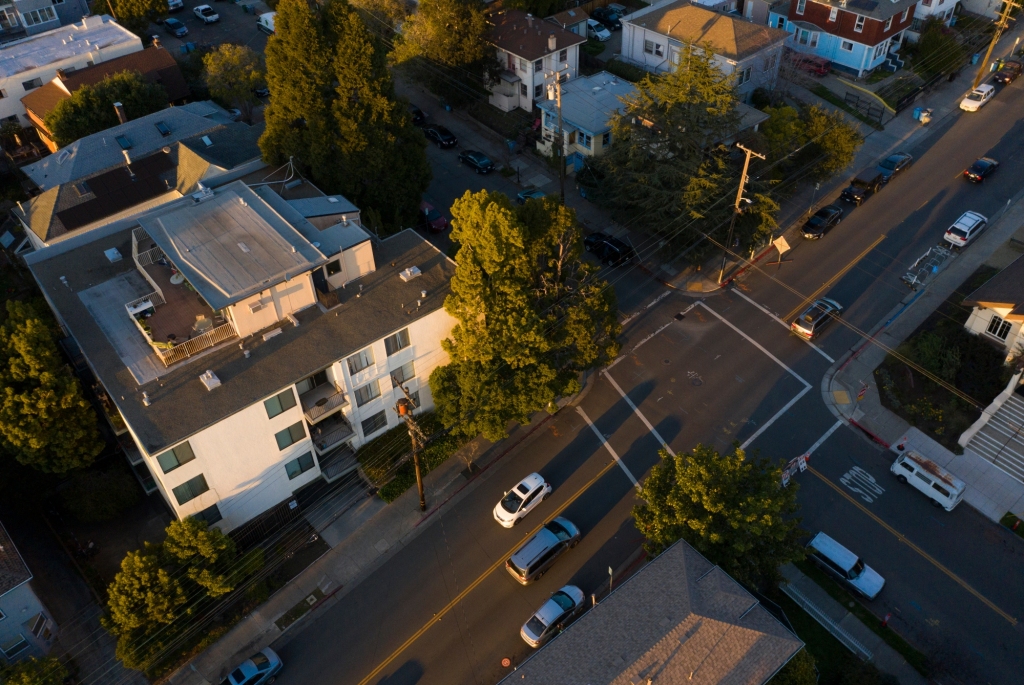Berkeley’s 1980s-era renter protections were some of the first and most comprehensive policies regulating affordable housing in the Bay Area, boasting rent stabilization and “good cause” eviction protections decades before neighboring cities.
On Tuesday, the Berkeley City Council will decide whether to put a measure on the November ballot to gauge voters’ support for strengthening those local rules by addressing lingering carve-outs within the city’s ordinance — at a time when rents across the East Bay are sky high and affordable housing construction is outpaced by market-rate development.
Affordable housing advocates argue that outdated elements of local controls have been circumvented by state laws, such as the Costa Hawkins Rental Housing Act of 1995, which allowed landlords to raise rents openly whenever tenants move out and prevented rent control from applying to any building constructed after 1980. Those rules, in part, have allowed rents to swell — reaching an average of nearly $3,000 in 2021.
However, an effort to strengthen local ordinances and close lingering loopholes has scores of small landlords up in arms, charging that Berkeley’s efforts to maintain affordable housing have crossed a line and may eliminate incentives to rent out “mom-and-pop” properties entirely.
Now, the city is considering asking voters if they support extending sweeping rent control and eviction policies to tenants living in accessory dwelling units (ADUs) on owner-occupied properties, in “golden duplexes,” which are properties built before 1980 where the owner occupies at least 50% of the housing complex, and in newly built units that replaced formerly affordable housing that was demolished for construction.
Since the original 1980 ordinance was approved by voters, the city would also need approval from voters on November 8 to move ahead with any amendments, which were recommended by the city’s joint task force of rent board members who meet with Councilmembers Kate Harrison, Rigel Robinson, Terry Taplin and Mayor Jesse Arreguín.
According to a report from the Anti-Eviction Mapping Project, the city’s median gross rent in 2019 was 50% higher than rates in 2005. Also in 2019, 53% of tenants — 13,794 total households — were rent burdened. Moreover, nearly one third of renters spent half of their income on housing costs, on average estimated to run around $3,165.
According to data supplied by the Berkeley rent board, which also commissioned the report, more than 90% of rent stabilized units have reached market rates since 1999, due in part to landlords’ right to increase rents in between tenant leases.
All Berkeley tenants — including those in “golden duplexes” and ADUs on a homeowner’s property — are currently protected by the city’s pandemic-era eviction moratorium, except in cases of health and safety concerns, until the council ends the local state of emergency. California’s statewide eviction ban expired July 1.
But Leah Simon-Weisberg, who chairs the rent board, says these proposals are vital before that moratorium ends. She argues that the ballot measure would not create new rent controls, but rather create a mechanism to extend existing statewide protections to Berkeley renters who are currently excluded.
If residents are serious about wanting to preserve the city’s current affordable housing, she said, this is one way to ensure that control by closing the last loopholes.
“This is Berkeley staying on top of the opportunities to create and protect affordable housing,” Simon-Weisberg said. Rather than focusing on how rent policies may impact a homeowner’s willingness to rent out units, she said the goal is instead to ensure that all tenants deserve a sense of security, “whether they are living in somebody’s backyard and sharing a driveway or living in a 16-unit building. Those tenants still have the right to the same level of dignity.”
Not all landlords and property owners agree.
While the list of reasons a tenant can be evicted with “good cause” includes renters who cause substantial damage, disturb peace and quiet and engage in unlawful activity, Berkeley property owner and realtor Ira Serkes says those exceptions don’t always translate into real life and are not always easy to prove.
Serkes, who is also a member of the Berkeley Property Owners Association, said he was a renter when he arrived in 1974. However, he understands why property owners who invested in golden duplexes or ADUs are angry now that the rules have changed.
“If you go into (renting property you own) with your eyes open, that’s one thing,” Serkes said, adding that he’s leased to primarily good tenants. “But in this case, it’s people who bought golden duplexes or built ADUs under the rules that said they’re exempt that are having the rug pulled out from under them.”
He says several homeowners have already said they will remove units from the market if this ballot measure of amendments to the city’s Rent Stabilization and Eviction for Good Cause ordinance is approved.
“They’re looking at what can benefit renters, and my position is one of, ‘What can we do to benefit owners?’” Serkes said. “But if you look at the whole perspective of what will provide the most amount of housing, will removing these exemptions increase housing? Absolutely not.”
It’s unknown how many of the council members who are tenants will actually vote on the issue. When similar changes were first proposed in July 2020, the item was derailed after several lawmakers recused themselves, for fear of conflicts of interest because they rented — or rented out — a unit.
Paola Laverde, Berkeley Tenants Union chair and a Rent Board Commissioner, said the idea that strengthening rent control will assist nightmare tenants or actually hinder the city’s housing market are all disingenuous efforts from property owners to keep power.
“Rent control is a jewel, and Berkeley is very fortunate to have it, but this is a business and people fight for their best interest in their business,” Laverde said. “Tenant voices need to be heard. We are part of the fabric of the community, and we bring diversity and flavor to Berkeley. To be treated as if we are commodities to be tossed to the highest bidder is irritating.”
The Berkeley City Council was set to vote on the potential ballot measures during its 6 p.m. meeting Tuesday.










